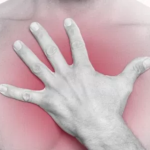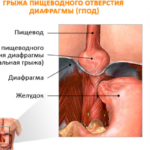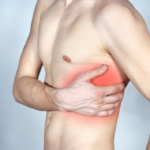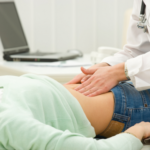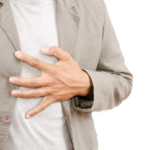Conservative treatment of esophageal hernia
A hernia of the esophageal opening of the diaphragm is more often diagnosed after 35 years in people who are overweight and have concomitant diseases of the gastrointestinal tract. This disease is characterized by the exit of the esophagus and part of the stomach through a weakened diaphragm into the chest cavity.
Such a disease is often asymptomatic, and is diagnosed when complications appear.
A hernia of the esophagus can be fixed and non-fixed, which determines the likelihood of infringement of organs in the hernial sac. In the first case, the stomach and the abdominal part of the esophageal tube, located above the diaphragm, do not move back into the abdominal cavity. The non-fixed form of the pathology is characterized by the free penetration of organs from one cavity to another, and in this case the risk of pinching is much lower.
Each type of disease manifests its symptoms and treatment will be selected, depending on the clinical and radiological picture.
It is possible to cure a hernia of the esophagus without surgery, and conservative therapy will be the main one, because the disease itself does not pose any danger and does not bother the patient if he adheres to a special diet and follows other important preventive measures.
Diaphragmatic hernia symptoms
Diaphragmatic hernia in its symptoms is similar to many other diseases of the respiratory, cardiovascular and digestive systems. Blurred clinical picture does not allow to start treatment of hernia of the esophageal opening of the diaphragm without a series of studies. Only after assessing the state of the organs of the chest and abdominal cavity, it is possible to draw a conclusion and begin symptomatic therapy.
Symptoms of ami hernia of the esophagus can be:
- periodic heartburn;
- hiccups after eating;
- increased sweating;
- chest discomfort;
- burning sensation in the chest area;
- shortness of breath and tachycardia;
- dysphagia, that is, problems with swallowing;
- rarely observed nausea and vomiting.
Excess weight and a frequent increase in intra-abdominal pressure can become the cause of such a disease.
Risk factors are chronic constipation, trauma and surgery. This disease is more common among men engaged in heavy physical work, and women during pregnancy and after childbirth.
Treatment methods for HH without surgery
The choice of effective treatment will be based on the form of the disease:
- Paraesophageal hernia. Above the diaphragm is a large part of the stomach, where a lot of food accumulates, which provokes constant discomfort and pain. This form of pathology is treated only surgically.
- Sliding hernia. Moves when changing the position of the body. First, conservative treatment is carried out, folk remedies and medicines are used at home. Diet and exercise are required. If such therapeutic measures do not give results and the condition worsens, a surgical operation is also prescribed.
General recommendations for diaphragmatic hernia:
- Eating . Proper nutrition is extremely important with a hernia of the esophagus. In order not to provoke soreness and heartburn, you should eat several times a day, swallow in small portions. The last meal should be two hours before bedtime, and in the morning before breakfast, you need to drink a glass of water.
- Sleep . In addition to the fact that for normal health it is necessary to get enough sleep, with an esophageal hernia, it is necessary to sleep on a high pillow. Ideally, the head should be located at a height of 10 to 15 cm. It would be even better to sleep on an orthopedic mattress so that all parts of the body, in particular the chest, take a normal anatomical position and are not constrained.
- Clothing . With a hernia of the esophagus, you need to wear loose clothing that will not put pressure on the chest and stomach. If you wear a tight outfit, it will provoke discomfort and soreness.
- Habits . With HH, frequent coughing is undesirable, which leads to an increase in intra-abdominal pressure, and provokes smoking. It is important to give up this addiction, as well as alcohol, because it affects the normal function of the liver, which often suffers from diaphragmatic hernia.
- Physical load . It is not recommended to lean forward, because this leads to squeezing, thereby provoking pain. With diaphragmatic hernias, it is useful to do breathing exercises. Heavy physical work and power sports are contraindicated.
Folk remedies
The main task of treating a hernia of the diaphragm without surgery will be to eliminate the symptomatic complex. Folk remedies help to cope with the manifestations of pathology. It is recommended that you first consult with your doctor about how to treat a hernia of the esophagus without surgery, but do not aggravate the condition.
The most common manifestation of the disease is heartburn. A very simple recipe helps to remove it, namely a soda solution. It can neutralize aggressive stomach acid, but it is not allowed to be used often. To eliminate heartburn, you need to drink a glass of water with a teaspoon of baking soda. This remedy is contraindicated for pregnant women due to the high salt content.
Chamomile and peppermint teas will also be helpful against the burning sensation in the chest area after eating. They can be drunk daily to prevent heartburn.
A remedy such as flaxseed porridge has proven itself well. It is necessary to pour three tablespoons of seeds in 100 ml of water and leave overnight. In the morning, this mixture should be eaten on an empty stomach instead of breakfast.
Paradoxically, lemon juice can also be helpful for diaphragmatic hernia. It neutralizes stomach acids, reducing their negative impact on the walls of the esophagus. It is necessary to add a few drops of lemon juice to half a glass of cold water and drink until you feel heartburn. It is better not to use such a remedy at home when there is hyperacid gastritis or peptic ulcer.
Drug therapy
Almost all therapeutic measures in the formation of a hernia are aimed at preventing the reflux of gastric juice into the esophagus. It is this phenomenon, which is defined as reflux, that provokes the main symptoms of the disease: heartburn, inflammation, foreign body sensation, soreness, and others.
Treatment of a hernia of the esophagus with folk remedies can not always get rid of these manifestations, therefore it is extremely important to take medications.
To eliminate the symptoms of hiatal hernia, 4 groups of drugs are used: antacids, H2-histamine receptor blockers, drugs to inhibit the production of gastric acid, and drugs to normalize motor function.
Medications for HH and their action:
- Antacids . These are drugs Maalox, Gastal. They bind hydrochloric acid, protecting the mucous membrane of the esophagus from its aggressive effects.
- H2 blockers - histamine receptors . This is Roxatidine, Famitidine. They affect the production of hydrochloric acid, inhibiting its production and intake.
- Drugs to stop the production of acid . This is Omeprazole, Pantoprazole.
- Preparations for the normalization of motor skills. This is Domperidone, Metoclopramide. They prevent reflux of stomach contents into the esophagus.
Medicines should be prescribed exclusively by the attending physician. Drugs that affect the secretion of gastric juice have contraindications for various pathologies of the gastrointestinal tract.
During the treatment period, it is important to regularly visit a doctor who will assess the dynamics of recovery and will be able to say whether a hernia can be cured without surgery, or whether the pathology requires surgical intervention.
Breathing exercises and exercise therapy
Breathing exercises will be an important step in the complex of therapeutic exercises. It must be performed 2 hours before meals.
It consists of several simple exercises.:
- Lie on your right side and put your head on the pillow. You need to take a deep breath and stick out your stomach, then exhale and relax.
- Get on your knees. While inhaling, make a slow tilt to the side, while exhaling, return to the starting position.
- Lie on your back. Calm your breathing and, at the same rhythm, make turns on one side, then on the other.
Diet
Treatment with folk remedies and drugs will be ineffective if you do not follow certain nutritional rules. With a diaphragmatic hernia, a condition such as reflux esophagitis, or inflammation of the walls of the esophagus against the background of acid irritation, very often occurs.
To protect yourself from such a complication or reduce its detrimental effect on the digestive tract, it is important to exclude foods that increase acidity and provoke the production of hydrochloric acid from the diet.
Principles of nutrition for a hernia of the esophagus:
- Normalization of acidity. Spicy dishes, confectionery, smoked meats, too salty and sweet foods are excluded.
- Power mode . You need to eat small portions 5 times a day. One meal should consist of no more than 200 ml of food. At the same time, breakfast should be dense, and dinner should be light.
- Prevention of constipation and bloating . Eliminate foods such as legumes, corn, yeast-leavened baked goods, whole milk, and sodas from your diet.
To understand how to cure a hernia of the esophagus without surgery, it is important to find out the cause of its occurrence. Only by eliminating the main risk factors, one can count on the effectiveness of conservative therapy. It should also be understood that treatment and prevention will be lifelong, therefore the psychological attitude to change lifestyle is also important.




